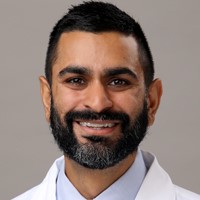Sickle Cell Treatment
Nation's Best Sickle Cell Care
Sickle cell disease is a chronic, incurable, genetic disease of the blood. About 100,000 Americans are affected by this disease, which occurs in one out of every 365 African Americans.
The Georgia Comprehensive Sickle Cell Center at Grady is the world’s first 24-hour acute care center for adult patients with sickle cell disease and the only comprehensive sickle cell center in Georgia. We provide comprehensive primary care by appointment and 24/7 acute care services for pain crisis management.
Our hematologists are specialists in sickle cell disease and your needs from that. We will be a steady companion and partner, providing the care you need.
Why Choose Us
No one in Atlanta has the Sickle Cell expertise you find at Grady.
Grady’s Sickle Cell Center treats thousands of patients a year for the full range of problems associated with the disease – from acute pain care to blood transfusions and disease modification treatments to reduce the rate of pain episodes.
Our sickle cell team understands the symptoms that sickle cell patients face, including joint and bone pain, fatigue, infections, and leg ulcers.
And, because Grady has one of the region’s most active research programs, we provide access to some of medicine’s most promising emerging therapies.
What We Treat
Sickle cell disease is common and can affect many people. We routinely care for the illnesses most common issues, including:
Sickle cell anemia is a condition in which there aren’t enough healthy red blood cells to carry oxygen adequately throughout your body. The red blood cells are shaped like sickles or crescent moons. This anemic condition typically results in fatigue.
Learn more about anemia.
People with sickle cell disease have an increased risk of developing certain infections, including pneumonia, bloodstream infections, meningitis, and bone infections, because sickle cells affect the spleen, leading to damage and poor protection against infection. We administer immunizations to help protect against infections.
Sickle cell patients can be affected by developing kidney disease. We have a multidisciplinary approach and have kidney specialists in the outpatient clinic to care for this complication.
Sickle cell patients commonly develop leg ulcers requiring intense wound care to reduce the pain and heal the lesion.
Learn more about leg ulcers.
Sickle cell patients may be at risk of stroke and acute chest syndrome. We reduce the risk by getting patients on chronic transfusions and disease-modifying treatments such as hydroxyurea.
Treatments We Offer
We provide the more comprehensive care available for sickle cell disease patients, including:
We provide in-center red blood cell exchange, also known as therapeutic erythrocytapheresis, and transfusion therapy. Erythrocytapheresis is a non-surgical therapy that removes and replaces a patient’s red blood cells. A patient’s blood is removed through a needle or catheter and circulated through a machine that separated red cells, white cells, platelets, and plasma. The red cells responsible for carrying oxygen to all parts of the body are discarded and replaced with donated red blood cells. The donor red blood cells circulate back to the patient with the other blood components (white cells, platelets, and plasma) through a return needle. Transfusion therapy involves regularly administering red blood cells to patients.
Hydroxyurea is a medicine that is used to reduce the frequency of pain and the need for blood transfusions in sickle cell patients. Hydroxyurea works by increasing the level of a special type of hemoglobin called hemoglobin F (HbF), which is more effective in binding and carrying oxygen around the body, reducing anemia symptoms.
We help to manage patient pain using a variety of non-narcotic prescriptions and other therapies.
L-glutamine (ENDARI), Crizanlizumab (ADAKVEO), and Voxelotor (OXBRYTA) are both recently FDA approved therapies for sickle cell disease and are available for consideration for treatment for sickle cell patients at the center.
We use a multi-disciplinary approach to treat these slow-healing wounds.
Make an Appointment
Call (404) 616-1000, Monday-Friday, from 6 a.m. to 11 p.m. to schedule your appointment.
If you are an existing Grady patient and have a MyChart account, visit MyChart to request your appointment online.
Locations and Directions
Grady Memorial Hospital
80 Jesse Hill Jr Drive SE
Atlanta, GA 30303
Ground Floor
Acute Care: 24 hours a day, 365 days a year
Outpatient Care: Monday - Friday: 8 AM - 4:30 PM
(404) 616-1000 (Main)
(404) 616-1000 (Appointments)
Parking is available
Public Transportation
- Georgia State Station (0.5 Miles)
Facilities
The Grady Sickle Cell Center is designed to meet the needs of each patient. We have:
- Acute care services for pain crisis 24 hours a day, 7 days a week
- Outpatient services with specialists in kidney disease, stroke, and transfusion therapy by appointment
Support Services
Sickle cell disease can take a serious toll on both patients and their families. To provide support, we offer:
- Social work service
- Sickle cell education
- Pediatric transition classes
Research
As one of the nation’s elite teaching hospitals, our clinicians are driven to explore new treatments and therapies for patients with sickle cell disease. They are involved in studies aimed at finding better and more effective ways to care for sickle cell patients. Research conducted at Grady is helping to redefine the way doctors around the world treat sickle cell. This commitment to research means that Grady offers the best standard of care – and the best emerging care. The benefit to patients is clear: they have access to treatment options unavailable at most other institutions.
Our Doctors
Every hospital treats patients. At Grady, we strive to treat them better, more efficiently, and more effectively. Our Sickle Cell Center is staffed by physicians, nurses, and other staff specialized in treating conditions that severely limit patients’ lives. This mission to care for all who need us attracts physicians from across the nation who are drawn to Grady because we test the limits of medicine through innovation and research.
Our zeal for innovation has given Grady a national reputation for medical advances in sickle cell, trauma care, burn, stroke, diabetes, infectious diseases, women’s health, sickle cell, and other conditions treated by specialists in our centers of excellence. Access to all these accredited practices is available to every Grady patient, and our collegial environment means that specialists routinely help to care for their colleagues’ patients.
Though clinicians are drawn by Grady’s reputation, most are employed by the Emory and Morehouse schools of medicine, which staff our medical services. Grady is one of a handful of U.S. health systems whose patients are cared for by faculty members of two medical schools. This reinforces our commitment to ongoing innovation.
Internal Medicine
Transfusion Medicine, Pediatric Hematology and Oncology


